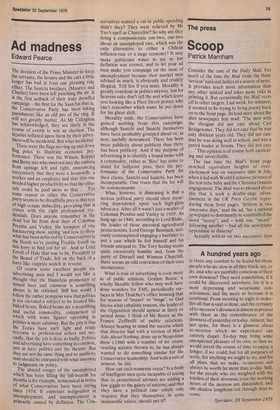Ad madness
Edward Pearce
The decision of the Prime Minister to keep the servants, the houses and the cars a little longer has had at least one pleasing side effect. The Saatchi brothers, (Maurice and Charles) have been left punching the air. It IS the first setback of their truly dreadful campaign — the first for the Saatchis that is; the Conservative Party has been taking punishment like an old pro of the ring. It Will not greatly matter. As Mr Callaghan has acknowledged, they are likely in the course of events to win an election. The ln. juries inflicted upon them by their advertisers will be incidental. But what incidents!
There were the flags moving up and down flag poles to illustrate economic performance. There was the Wilson, KePPel and Betty trio who swerved into the camera from upstage left and right, announcing successively that they were a housewife, a worker and an employer and that this one needed higher productivity so that the other Side could be paid more so that . . . For some reason or other the Conservative Party seem § to be dreadfully prey to this sort of high octane imbecility, providing that it comes with the right professional credentials. Does anyone remember in the dead but far from dear days of Coleman Prentiss and Varley, the t ompere of one huckstering show, saying 'and now to show What has been achieved by Conservatives in the North we're putting Freddie Erroll on this lorry to find out for us'. And so Lord Erroll of Hale that was to be, President of the Board of Trade, fell on the back of a lOrry like cutprice scotch in reverse. Of course some excellent people are advertising men and I would not like it thought that the blameless promotion of tinned beer and catsmeat is something always to be criticised. Still less would I follow the rather pompous view that politics IS too elevated a subject to be treated like baked beans. Baked beans are a nourishing and useful commodity, comparison of Which with some figures operating in politics is mere calumny. But the pity is that the Tories have such light and ready recourse to professional sellers and secondly, that the job is done so badly. Politics and advertising have something in common, just as have politics and the theatre. But they are not the same thing and no publicity man should be entrusted with what amounts to judgments on policy. The absurd conger of the unemployed Which has been filling the bill-boards for months is for example, nonsensical in terms of what Conservatives have been saying since 1974. It expresses indignation at unemployment, and unemployment is Primarily caused by deflation. The Con servatives wanted a cut in public spending didn't they? They were relieved by Mr Yeo's spell as Chancellor? So why are they doing a compassionate one-two, one-two about an unemployed rate, which was the only alternative to either a Chilean inflation-rate or a siege economy? It may make politicians wince to say so but deflation was correct, and to let your ad men make you compaign on the issue of unemployment because their market men advised as much, is obviously and crudely illogical. Tell lies if you must. Morality is greatly overdone in politics anyway, but for heavens sake don't tell the sort which leave you looking like a Fleet Street printer who can't remember which name he put down for his ghost shift. Morality aside, the Conservatives have gained nothing from this campaign, although Saatchi and Saatchi themselves have been profitably gossiped about or, as now, usefully denounced. There has been more publicity about publicity than there has been publicity. And if the purpose of advertising is to identify a brand name with a commodity, rather as `Biro' has come to stand for ballpoint pens, then the performance of the Conservative Party for their clients, Saatchi and Saatchi, has been incomparable. One trusts that the fee will be commensurate.
What, however, is distressing is, that a serious political party should show recurring dependency upon such high-gloss advocacy. After all it wasn't just a matter of Coleman Prentiss and Varley in 1959. As long ago as 1846, according to Lord Blake, the leader of those ancestral agricultural protectionists, Lord George Bentinck, seriously contemplated engaging a barrister to put a case which he felt himself and his friends unequal to. The Tory feeling seems quite excessively humble and, from the party of Disraeli and Winston Churchill, there seems an odd conviction of their own incoherence.
What is true of advertising is even more so of public relations. Gordon Reece, a wholly likeable fellow who may well have done wonders for EMI, periodically surfaces in Mrs Thatcher's office insisting that for reasons of 'impact' or 'image', or God knows what cabalistic reasons, the leader of the Opposition should appear in fancy or period dress. I think of Mr Reece as the Franco Zeffirelli of public relations. Always bearing in mind the success which that director had with a version of Much Ado About Nothing, done up in Neapolitan dress c.1860 with a number of ice cream vending accents thrown in, he has always wanted to do something similar for the Conservative leadership. And with a suit of armour, he did.
How can such nonsense occur? Is a body of intelligent men quite incapable of seeing that its promotional advisers are adding a low giggle to the gaiety of nations; and that they have a political case which only requires that they themselves, in quite reasonable voices, should put it?


































 Previous page
Previous page